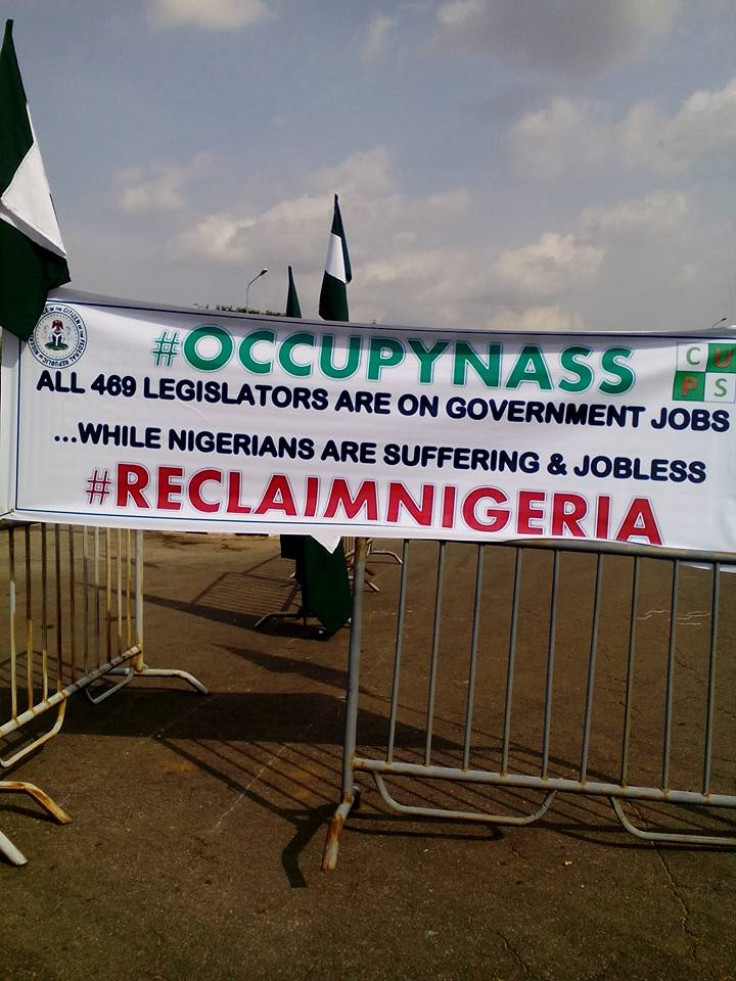Nigeria corruption: OccupyNASS protesters urge senate president Bukola Saraki to resign

Hundreds of Nigerians are calling for the immediate resignation of senate president Bukola Saraki over graft allegations. Saraki, former governor of Kwara state, has been charged with 13 counts of corruption by the Code of Conduct Tribunal (CCT).
Saraki is accused of making false declarations of assets, transferring millions of Naira to accounts outside Nigeria and acquiring assets beyond his earnings during his time in office as governor. He has pleaded not guilty.
After the charges were made public earlier in April, hundreds of Nigerians took to the streets in a protest dubbed on social media as "OccupyNASS". Protesters marched to the National Assembly in Abuja preventing people from entering or leaving the premises.
Demonstrators – mainly students and members of civil society organisations – called for Saraki's resignation, the approval of this year's budget and for senators to return expensive Land Cruiser four-wheel drive cars recently acquired. As the protest entered its second day on 27 April, organisers vowed they will demonstrate until their demands were met and will occupy the assembly for the next four days.
Pro-Saraki protesters clashed with demonstrators and rejected the corruption charges claiming they were an attempt to muzzle the senate. Meanwhile, senate leader Ali Ndume condemned the protest arguing it would negatively affect the country's democracy.
"That is why we are not trying to say anything about them because what is happening out there is a very dangerous precedent that we are trying to set," he was quoted by local media as saying. "Nigerians and you too, press, will have to be able to help to define rights, know where your rights end and my own starts.
#OccupyNASS locks down national assembly https://t.co/W3I7dDP4py via @naijainfobox pic.twitter.com/azu1fcG3jG
— NIB (@naijainfobox) April 27, 2016
NASS moves to resolve budget impasse in a matter of days. Hope they stick to this promise but if not, # OccupyNASS
— Mustapha Saeed (@MustapherSaeed) April 27, 2016
Widespread corruption
OccupyNASS emerged as several Nigerian officials have been accused of corruption and money laundering after President Muhammadu Buhari ordered an investigation into arms procurement, amid suspicions millions of dollars had been stolen by corrupted officials.
Among other things, the probe led to the discovery that $2.1bn intended for use in the fight against Boko Haram terrorists in the country's north-east had gone missing. Meanwhile, information minister Lai Mohammed alleged that Nigerian officials and state employees had stolen $6.8bn from public funds during the previous administration between 2006 and 2013.
Buhari vowed he would eradicate corruption after taking office in May 2015. He has sought the help of several countries, including the UK, the US and the United Arab Emirates (UAE), to locate and repatriate embezzled Nigerian funds stashed away outside the African nation.
In an exclusive report by IBTimes UK, members of Security in Africa and Potent Communications warned that Nigerian stolen funds repatriated to the African nation risk being embezzled again, making corruption a vicious circle difficult to break.
© Copyright IBTimes 2024. All rights reserved.






